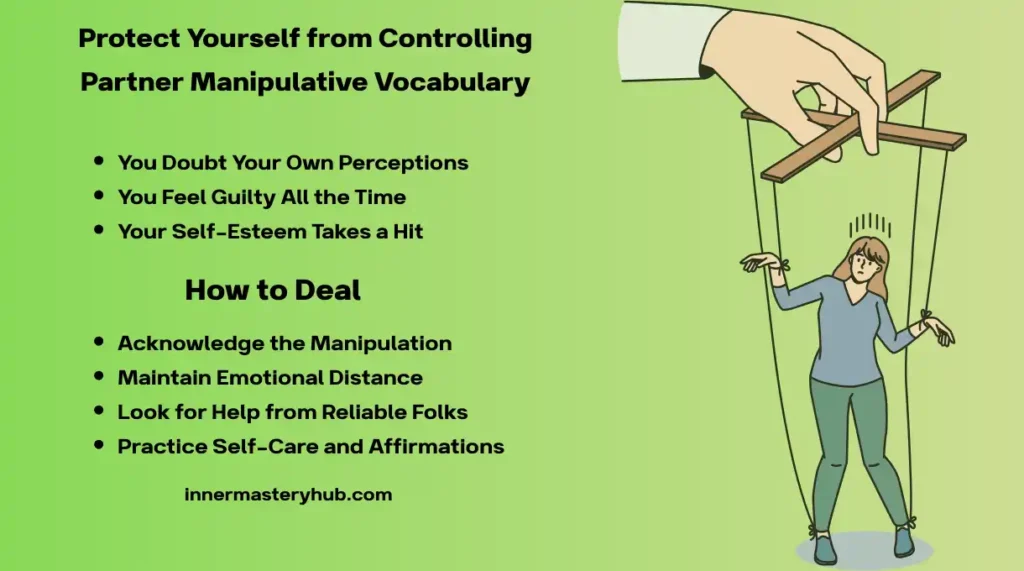How to Protect Yourself from Controlling Manipulative Vocabulary?

Relationships should feel loving, safe, and supportive. But sometimes it’s undeniable that something is missing. Has the way your partner speaks to you ever caused you to doubt your feelings, thoughts, or behavior? You may be coping with a controlling manipulative vocabulary. You may experience confusion, loneliness, or even guilt for actions you did not take as a result of this very strong language.
Recognizing the Controlling Manipulative Vocabulary
Acknowledging the issue is the first step. It is not always necessary for a controlling partner to yell at you or raise their voice to dominate the situation. Using words that are deliberately chosen to distort your reality is one of the most harmful ways they accomplish this. They could give you the impression that you’re overreacting, that you’re unworthy, or that you’re to blame for all the problems in the relationship.
They may use statements like “You’re too sensitive” or “You’re imagining things” to minimize your emotions. You may even hear something along the lines of, “You wouldn’t act this way if you truly loved me.” These deceptive statements gradually weaken your feeling of identity and independence.
According to research, one of the most effective strategies for managing relationships is the use of language. A study published in the Journal of Social and Personal Relationships found that individuals in manipulative relationships frequently report feeling confused about their own emotions and behavior. Your confidence might be damaged and doubts sown by your partner’s statements, which makes it more difficult to believe in your own judgment.
How Does Controlling Manipulative Language Affect You
Now, let’s talk about how this type of vocabulary can affect you emotionally and mentally.
You Doubt Your Own Perceptions
Have you ever heard your significant other call you “too dramatic” or “overreacting”? Despite their apparent innocence, these statements have the potential to cause you to question your own experiences over time. You start to doubt how you feel. You could ask yourself, “Am I really overreacting?”
This is a psychological manipulation technique known as “gaslighting,” in which your partner distorts the truth to make you feel guilty when, in reality, they are at fault. This kind of deception leaves you unsure of what is real and what isn’t.
You Feel Guilty All the Time
When you ask for what you deserve in a relationship, set boundaries, or require space, a controlling spouse may also use phrases that make you feel bad. Often used to place the blame back on you is the statement, “If you really cared about me, you’d understand.” By merely stating your wants, you can give yourself the impression that you are the one who is doing it improperly.
Your Self-Esteem Takes a Hit
Your self-esteem is frequently undermined by the language used in a domineering relationship. Hearing that you’re not good enough or that you’re being unreasonable all the time might harm your self-esteem over time. In other aspects of your life, as well as in the relationship, you may start to question your value.
People who are in abusive relationships, especially those that involve controlling manipulative words, are more likely to experience anxiety and despair, according to a study published in the American Journal of Psychiatry. These emotional difficulties frequently stem directly from the poisonous atmosphere that a domineering partner’s words have produced.
How to Deal with a Controlling Manipulative Vocabulary
While recognizing the problem is the first step, the real change comes when you take action to protect yourself. Here’s how to deal with it effectively:

1. Acknowledge the Controlling Manipulative Language
Realizing that you are not at fault for what your partner has said is the first and most crucial step. To keep things under control, they are manipulating the situation. Once you accept this, you may begin to separate yourself from the emotional impact of their language on you. Remember that you are entitled to respect and that your thoughts and feelings are legitimate.
2. Set Clear Boundaries
Setting boundaries is among the most empowering actions you can take. Calmly point out any controlling manipulative words your spouse may be using. For instance, you could answer, “I disagree with that,” in response to their statement that you’re overreacting. I’m merely conveying how I feel. By establishing limits, you’re letting others know that this type of manipulation won’t be accepted.
3. Maintain Emotional Distance
You should safeguard your emotional health. If you’re being affected by what your partner says, move back. Walking away, taking a moment to catch your breath, or taking a break from the talk could all be beneficial. This enables you to put emotional distance between the controlling manipulative language they’re using and yourself.
4. Look for Help from Reliable Folks
Being with a controlling partner can make you feel alone, especially if they try to make you believe that no one else can relate to your relationship. Speaking with a therapist, family member, or trusted friend, however, can offer perspective and clarity. They can assist you in observing the manipulation from an external perspective, which may facilitate its identification and resistance.
5. Practice Affirmations
The first step in retaliating against controlling manipulative language is to boost your self-esteem. Take care of yourself and reinforce your value regularly. You deserve respect, love, and strength, so remind yourself of that. Remaining grounded and less impacted by your partner’s hurtful remarks can be achieved by engaging in self-boosting activities, such as exercising, keeping a journal, or spending time with supportive individuals.
Applying These Tips in Real Life
For example, your partner may say, “You never listen to me.” Know that this is a controlling manipulative language, and don’t take it personally. Calmly acknowledge your emotions in response by saying, “I do listen, but I feel like you’re dismissing what I have to say.” This strategy allows you to declare your own reality without making things worse, which helps end the loop of manipulation.
As an additional illustration, disregard your partner’s statement that “no one else would put up with you.” Instead, remind yourself that mutual respect is the foundation of a strong partnership. Ask a buddy for help and reaffirm your value as a person deserving of respect and kindness.
Protect Yourself and Take Control
It’s difficult to deal with a controlling manipulative language, but you can do it if you have the correct resources. Regaining control and safeguarding your mental and emotional well-being can be achieved by acknowledging the issue, disrupting the effects of controlling manipulative language, and providing a workable solution. Never forget that controlling manipulative language in any form is not acceptable.
To break free from the pattern of manipulation language effects, you’ll need to establish boundaries, keep emotional distance, and look for help. You deserve a relationship where your wants and feelings are recognized and acknowledged, so keep going strong and have faith in yourself.
Frequently Asked Questions About Controlling Manipulative Vocabulary
What is controlling manipulative vocabulary in relationships?
Controlling manipulative vocabulary is the use of particular words to manipulate, guilt, or perplex a partner. Words like “You’re overreacting” or “If you loved me, you would…” are frequently used.
How can I identify controlling manipulative vocabulary from my partner?
What signs of controlling manipulative language may I look for in my partner? Look for trends in your partner’s use of guilt-inducing language, shifting responsibility, or dismissing your feelings. The purpose of these strategies is to control the narrative and erode your confidence.
Is gaslighting a form of controlling manipulative vocabulary effect?
Does the use of controlling manipulative language include gaslighting? To make you doubt reality, a spouse may use the manipulative technique of gaslighting, which involves denying facts or happenings. The expressions “That never happened” and “You’re just imagining things” are frequently used.
Why do controlling partners use the manipulative vocabulary effect?
By twisting facts, confusing their partner, and making them question their thoughts and perceptions, they attempt to gain control and influence over them.
Can controlling manipulative vocabulary affect my mental health?
Indeed. Extended use of deceptive language can cause anxiety, despair, and a lowered feeling of self-worth.
How can I respond to the controlling manipulative vocabulary?
Establish limits, express your emotions in a composed manner, and look for help from dependable family members, friends, or experts.
Is it possible to change a partner who uses manipulative partner vocabulary?
If the spouse accepts responsibility for their actions and gets expert assistance, change can occur. Prioritizing your safety and well-being is crucial, though.
What are some common phrases used as controlling manipulative vocabulary?
Phrases like “I was just kidding,” “You’re too sensitive,” and “Everyone else thinks you’re wrong” are ways to keep control and minimize your emotions.
How can I protect myself from the controlling manipulative vocabulary?
To preserve clarity in your relationship, educate yourself about deceptive techniques, follow your gut, and look for outside viewpoints.
When should I seek professional help regarding controlling manipulative language?
Speak with a therapist or counselor if you constantly feel devalued, puzzled, or in control to handle the issue safely.






